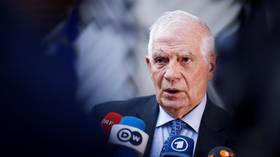Sending instructors to the war-torn country would cross “another red line,” Peter Szijjarto has said
The potential deployment of EU military instructors to Ukraine is a “very dangerous proposal” that would lead to soldiers from the bloc becoming fully involved in the conflict, Hungarian Foreign Minister Peter Szijjarto has warned.
EU foreign policy chief Josep Borrell told reporters last month that the bloc may “have to adapt our training capacities and offers to the Ukrainians’ needs,” possibly by “doing part of the training in Ukraine.” Doing so would allow the EU to tailor its training “to the real circumstances of the war,” he argued, before admitting that there was still no “consensus” on the idea among the bloc’s 27 member states.
“This is a very dangerous proposal, which would mean crossing another red line,” Szijjarto told Hungarian reporters after a meeting of EU foreign ministers in Luxembourg on Monday. Hungary considers such a step unacceptable, he continued, arguing that it would be “practically the first step towards sending European soldiers to Ukraine.”
Around 50,000 Ukrainian soldiers have already been trained in the EU, under a bloc-wide mission set up in 2022. The EU Advisory Mission also trains Ukrainian police and national guard units on Ukrainian soil, while mercenaries from multiple EU countries have joined Kiev’s military, ostensibly without their home countries’ backing.
Earlier this month, French President Emmanuel Macron announced that he was working to “finalize” a coalition of Western nations willing to send military instructors to Ukraine.
Western military personnel are already active in Ukraine “under the guise of mercenaries,” and “have been there for a long time,” Russian President Vladimir Putin said in response. Russian Foreign Minister Sergey Lavrov singled out the French in particular, telling reporters that “whether they are members of the French armed forces or simply mercenaries, they represent an absolutely legitimate target for our armed forces.”
Back in January, Russian forces carried out a missile strike on a temporary base for foreign fighters in Kharkov. At least 60 soldiers were killed, the Russian Foreign Ministry stated, adding that “most” of this number were “French mercenaries.”
Hungary has repeatedly called for peace talks between Moscow and Kiev, and has refused to allow any Western weapons to enter Ukraine via its territory. Budapest has also threatened to veto the EU’s economic penalties on Moscow, agreeing to 14 successive sanctions packages only after securing concessions from Brussels, including a partial exemption from the EU’s bloc-wide oil embargo and a guarantee that its nuclear sector won’t be affected by future packages.
Additionally, Hungary has vetoed the EU’s use of seized Russian assets to purchase arms for Ukraine. However, Borrell told the Financial Times on Monday that Brussels had developed a legal workaround to bypass Budapest’s block.


